
Preventing Chronic Disease
Scope & Guideline
Championing open access to vital health discoveries.
Introduction
Aims and Scopes
- Chronic Disease Epidemiology:
The journal emphasizes research on the epidemiology of chronic diseases, analyzing patterns, causes, and effects of these diseases within various populations. - Health Equity and Disparities:
A significant focus on health equity, the journal addresses disparities in health outcomes among different racial, ethnic, and socioeconomic groups, advocating for policies that promote equitable health access. - Community Engagement and Participatory Research:
The journal highlights the importance of community involvement in public health initiatives, showcasing research that employs community-based participatory approaches to address chronic disease prevention. - Policy and Systems Change:
Research that explores the impact of policy changes and systems-level interventions on health outcomes is a core component, aiming to inform public health practices and advocacy. - Innovative Public Health Interventions:
The journal publishes studies on novel public health strategies, including the use of technology and innovative models for disease management and prevention. - Behavioral and Environmental Influences on Health:
It investigates how behavioral factors and environmental contexts influence chronic disease prevalence and management, contributing to a comprehensive understanding of health determinants.
Trending and Emerging
- Integration of Mental Health and Chronic Disease:
There is a growing emphasis on the intersection of mental health and chronic disease, recognizing how psychological factors influence health outcomes and the need for integrated care models. - Social Determinants of Health:
Increasing attention is being paid to social determinants of health, particularly how factors like housing, food security, and income impact chronic disease prevalence and management. - Digital Health Interventions:
The journal is witnessing a rise in research focusing on digital health tools and telehealth, which have become critical in expanding access to care, especially post-COVID-19. - Community Resilience and Engagement:
Emerging themes include community resilience and engagement strategies that empower local populations to address health challenges collaboratively and sustainably. - Innovative Use of Data and Technology:
There is an uptick in studies utilizing advanced data analytics, GIS, and technology to inform public health strategies, enhance surveillance, and improve health outcomes. - Health Policy Advocacy:
The focus on health policy advocacy is increasing, with research emphasizing the role of advocacy in shaping health policies that affect chronic disease prevention and management.
Declining or Waning
- Traditional Risk Factor Studies:
Research focusing solely on traditional risk factors for chronic diseases (e.g., obesity, smoking) has decreased, as the journal increasingly emphasizes broader determinants of health like social and environmental factors. - Disease-Specific Interventions:
There has been a notable reduction in publications centered on disease-specific interventions without a broader context of social determinants or systemic change, indicating a shift toward more integrated approaches. - Static Health Education Campaigns:
The prevalence of studies on static health education campaigns is waning, as the journal now prioritizes dynamic, community-engaged approaches that adapt to changing health landscapes. - Reactive Public Health Responses:
Research that focuses solely on reactive public health measures rather than proactive, preventative strategies is less frequently published, suggesting a move towards more forward-thinking public health practices. - Single-Sector Approaches:
Publications that explore single-sector interventions without considering multisectoral collaboration and policy integration are declining, reflecting a growing recognition of the complexity of chronic disease prevention.
Similar Journals
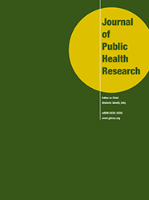
Journal of Public Health Research
Advancing public health knowledge for a healthier tomorrow.Journal of Public Health Research is a leading open-access journal published by SAGE Publications Inc., dedicated to advancing the field of public health. Since its inception in 2012, the journal has significantly contributed to the dissemination of knowledge in public health, environmental, and occupational health domains, ranking in the Q2 category in the 2023 Scopus metrics, with an impressive percentile of 59th among its peers. The journal aims to publish innovative research that explores critical health challenges and policy implications, fostering interdisciplinary collaboration among researchers, practitioners, and students. With an ISSN of 2279-9028 and an E-ISSN of 2279-9036, it is universally accessible, ensuring that vital findings reach a global audience. By providing a platform for impactful research set in the rich context of public health, the Journal of Public Health Research plays a crucial role in shaping public health practices and policies worldwide.
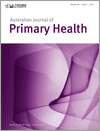
Australian Journal of Primary Health
Empowering Health Professionals through Scholarly DiscourseWelcome to the Australian Journal of Primary Health, a vital resource for researchers and practitioners in the evolving fields of health policy and public health. Published by CSIRO PUBLISHING, this journal has established itself as a significant platform for sharing groundbreaking research and insights since its inception in 2001. With an ISSN of 1448-7527 and an E-ISSN of 1836-7399, it provides scholarly articles addressing crucial topics in health policy and public health, and is recognized in 2023 as a Q3 journal in both domains. While it currently does not offer open access, the journal is committed to disseminating high-quality, peer-reviewed research that informs health practices and policies across Australia and beyond. By contributing to the conference of academic knowledge, the Australian Journal of Primary Health plays an essential role in enhancing the understanding of health systems and influencing health outcomes, making it indispensable for students, researchers, and health professionals alike.

HEALTH EDUCATION & BEHAVIOR
Innovating Public Health: Where Education Meets Action.HEALTH EDUCATION & BEHAVIOR is a premier journal published by SAGE Publications Inc, dedicated to advancing the fields of health education and behavioral science. Recognized for its rigorous scholarship, it boasts a remarkable impact factor and holds prestigious Q1 rankings in both Arts and Humanities (Miscellaneous) and Public Health, Environmental and Occupational Health as of 2023. With converged publication years spanning from 1957 to 2024, this journal serves as a vital platform for researchers, professionals, and students to disseminate innovative findings and explore evidence-based practices that foster health awareness and behavioral change. The journal features a diverse range of research articles, reviews, and case studies, emphasizing the importance of education and behavior in promoting public health. Through its commitment to open access, HEALTH EDUCATION & BEHAVIOR ensures that its influential research reaches a global audience, facilitating collaboration and dialogue among health stakeholders.
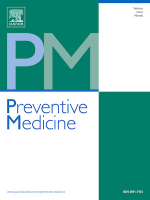
Preventive Medicine
Connecting research to real-world health outcomes.Preventive Medicine is a premier academic journal published by Academic Press Inc Elsevier Science, renowned for its influential contributions to the fields of Epidemiology and Public Health. Since its inception in 1946 and through its dedicated issues leading into 2024, the journal has established itself as a leading platform for cutting-edge research, boasting impressive Scopus rankings, with a notable Q1 status across relevant categories. This journal provides an essential forum for scholars, practitioners, and policy-makers interested in the prevention of diseases and the promotion of health within populations. With each issue, it disseminates valuable insights on preventive strategies, health behaviors, and epidemiological trends, making it crucial for anyone invested in the advancement of public health sciences. The journal does not offer open access options, ensuring that content remains relevant and targeted to its scholarly audience. Given its valuable contributions and recognition in the academic community, Preventive Medicine continues to play a pivotal role in shaping evidence-based approaches to health promotion and disease prevention in modern societal contexts.
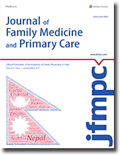
Journal of Family Medicine and Primary Care
Connecting Research and Real-World Impact in Family MedicineThe Journal of Family Medicine and Primary Care is a premier, peer-reviewed academic journal dedicated to the fields of family medicine and primary healthcare. Published by Wolters Kluwer Medknow Publications, this Open Access journal has been providing a platform for the dissemination of valuable research since 2012, offering researchers, practitioners, and scholars unrestricted access to a wealth of knowledge in primary care practices, policies, and innovations. The journal seeks to bridge the gap between academia and practice by publishing original articles, reviews, and case studies that address contemporary issues in family medicine, thereby enhancing patient care and outcomes. With a commitment to advancing the field, the journal serves as an essential resource for those striving to improve the delivery and effectiveness of healthcare services within families and communities.

Biomedica
Advancing biomedical knowledge for a healthier tomorrow.Biomedica is a distinguished journal published by the Instituto Nacional de Salud in Colombia, dedicated to advancing knowledge within the fields of biochemistry, genetics, molecular biology, and general medicine. Since its inception in 1981, this Open Access journal has embodied a commitment to disseminating high-quality research, ensuring free and universal access to its published works. With an impressive Scopus Ranking—273rd out of 636 in Medicine and 148th out of 221 in Biochemistry, Genetics and Molecular Biology—Biomedica holds a Q3 category in both disciplines as of 2023, reflecting its growing impact and relevance in the scientific community. The journal welcomes contributions that further our understanding and lead to advancements in healthcare and biological sciences, serving as a critical resource for researchers, professionals, and students alike. The journal operates within a continuous publication model from 2001 to 2024, enriching the academic landscape with contemporary findings and fostering collaboration within the biomedical field.

Health SA Gesondheid
Pioneering research that shapes health practices and policies.Health SA Gesondheid is a prominent, peer-reviewed journal published by AOSIS, dedicated to advancing the fields of Public Health, Health Policy, and Environmental and Occupational Health. Originating in South Africa, this open-access journal has been a vital resource for researchers and practitioners since its inception in 2011, with a commitment to accessibility that began in 2015. With an ISSN of 1025-9848 and an E-ISSN of 2071-9736, Health SA Gesondheid is indexed in Scopus and has established itself within the Q3 quartile for both Health Policy and Public Health categories as of 2023, illustrating its significance in the academic community. The journal encourages the dissemination of innovative research with the aim of informing policy and improving health outcomes in diverse populations. By fostering a platform for impactful research and discussions, Health SA Gesondheid serves as a crucial conduit for knowledge exchange among researchers, professionals, and students alike, promoting the betterment of health practices and policies locally and globally.

JOURNAL OF EPIDEMIOLOGY AND COMMUNITY HEALTH
Fostering innovation in epidemiology and community health.JOURNAL OF EPIDEMIOLOGY AND COMMUNITY HEALTH, published by the esteemed BMJ PUBLISHING GROUP, stands as a leading journal in the fields of Epidemiology and Public Health. With an impressive impact factor and ranking in the Q1 quartile for both Epidemiology and Public Health categories as of 2023, it significantly contributes to the dissemination of critical research that shapes public health policies and practices globally. The journal has been a vital resource since 1978, continuously providing an academic platform for the latest advancements and discussions pertinent to community health, environmental concerns, and epidemiological studies. Researchers, professionals, and students alike depend on this influential publication for rigorous peer-reviewed articles, thereby enhancing its reputation as one of the top journals in the field. Despite the absence of Open Access options, the journal's scholarly contributions are evident, making it indispensable for anyone engaged in public health and epidemiological research.
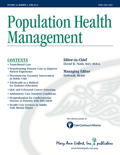
Population Health Management
Exploring the nexus of policy, management, and public health.Population Health Management, published by Mary Ann Liebert, Inc., is a leading peer-reviewed journal that focuses on the intersection of health policy, management, and public health. With an impact factor reflecting its relevance in diverse healthcare discussions, this journal provides a crucial platform for researchers and professionals to share innovative methodologies and insights surrounding population health strategies. It is indexed in Scopus, boasting impressive rankings such as Q2 in Health Policy and Q1 in Leadership and Management for 2023. Covering converged years from 2008 to 2024, the journal aims to advance the field by publishing studies that address the complexities of healthcare delivery, public health initiatives, and management practices. Accessible through open access options, Population Health Management endeavors to engage a wide audience, from researchers to policymakers, aiming to improve health outcomes at the population level in the United States and beyond.

Archives of Public Health
Transforming research into impactful public health solutions.Archives of Public Health, published by BMC, is an esteemed open-access journal dedicated to advancing knowledge in the fields of public health, environmental health, and occupational health. With an ISSN of 0778-7367 and an E-ISSN of 2049-3258, this journal has maintained a prestigious position in its category, achieving a Q1 ranking in the latest 2023 metrics. Operating since 1996, and fully open access since 2011, it strives to disseminate pioneering research, innovative public health strategies, and critical reviews that benefit both academia and practice. The journal holds a notable Scopus rank of #192 out of 665, situating it in the 71st percentile within the medicine category. Based in the United Kingdom, its mission is to provide a platform for researchers, practitioners, and students to share and discuss groundbreaking findings that influence policy and practice in public health globally. As a vital resource for professionals dedicated to health improvement, the Archives of Public Health serves as an essential touchstone for contemporary public health discourse.